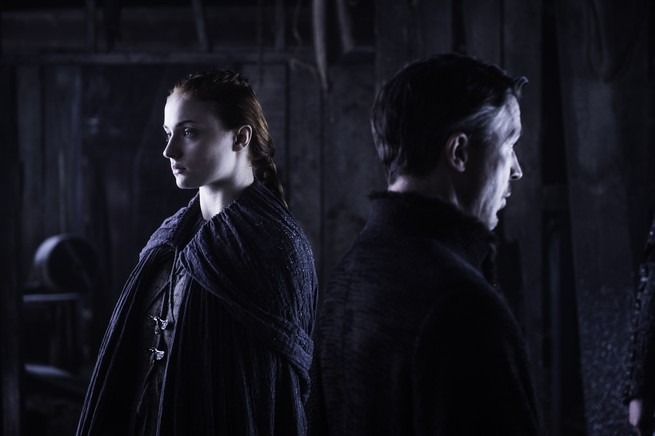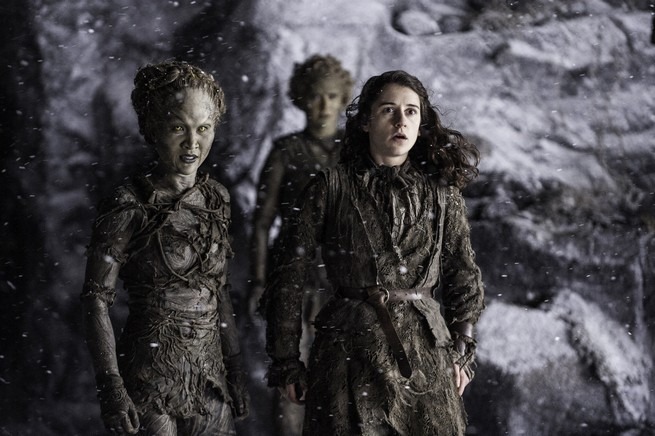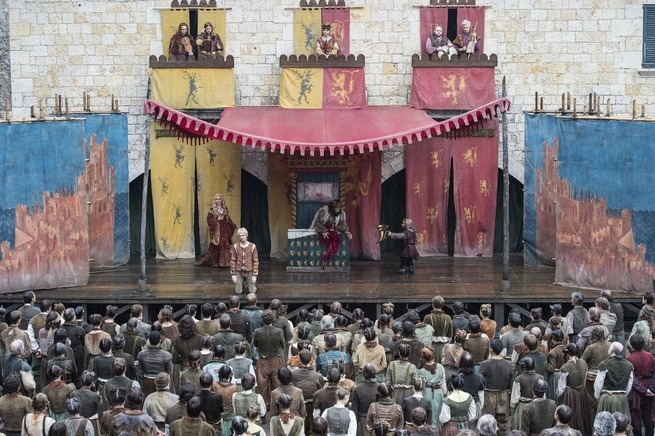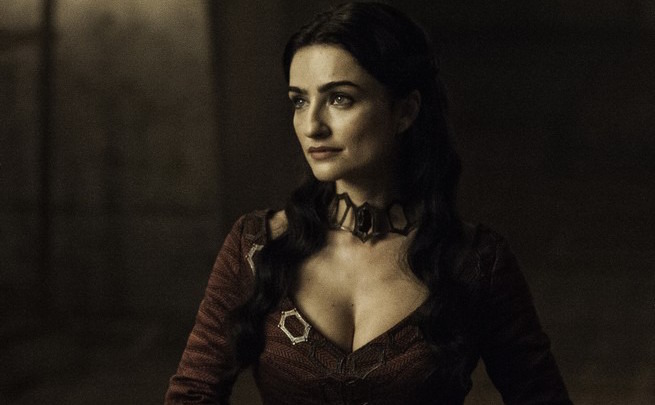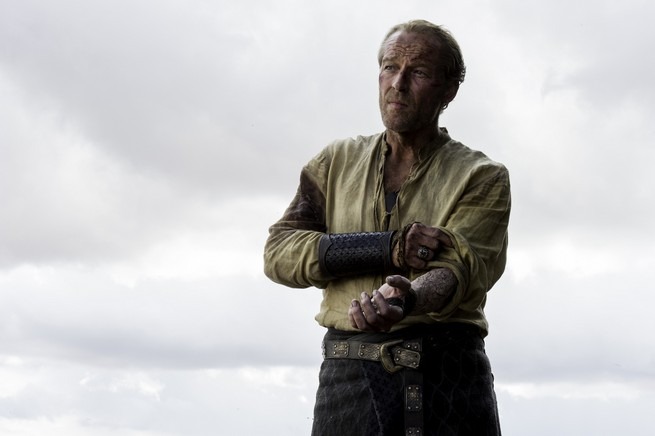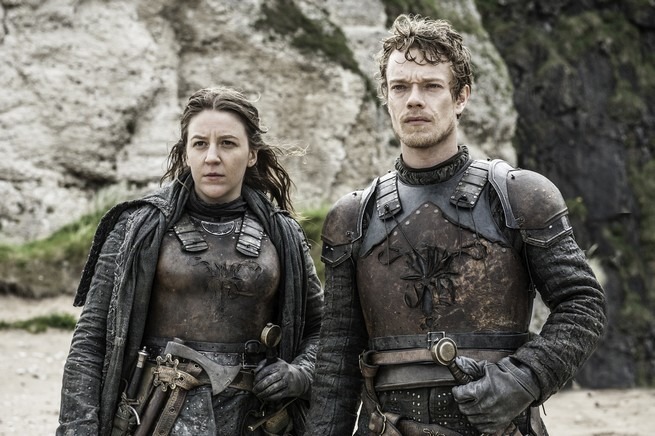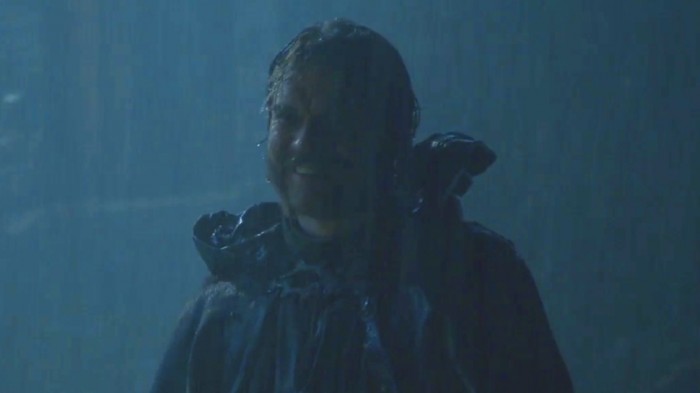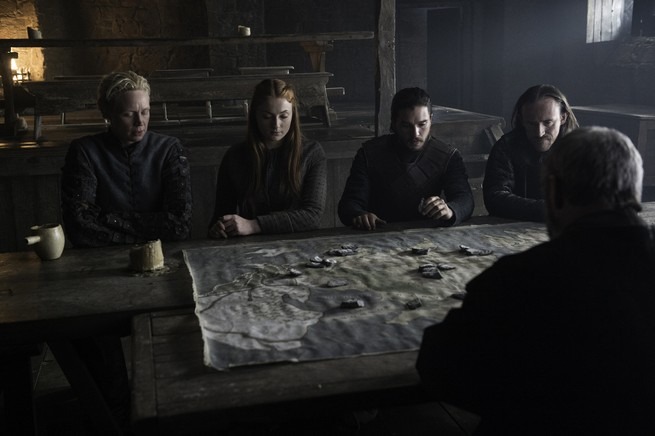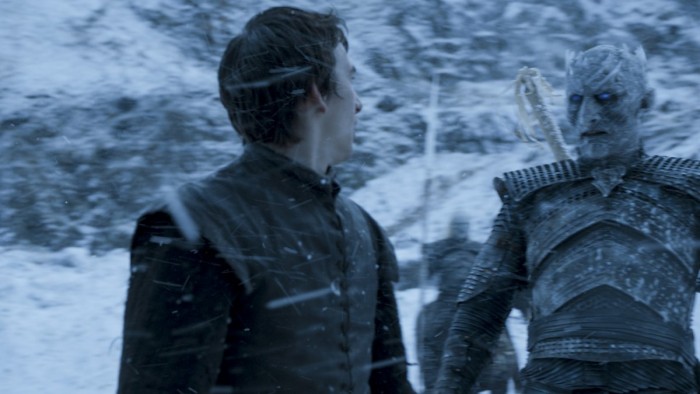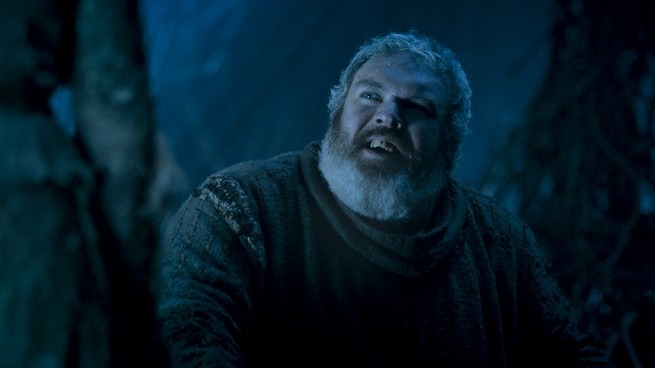'Game Of Thrones' Season 6 – The 10 Most Important Moments In "The Door"
We've reached the halfway point of Game of Thrones season six and the meticulously assembled dominos of the past five or so years have officially started tumbling down. "The Door" is an hour of major story progression, vital character development, and revelations that manage to redefine much of what we've seen before. If we didn't already know that the show had an end in sight, episodes like this would clue us in to that fact. Game of Thrones is burning Westeros down this season and, as usual, no one is safe. Let's run through the most important things that happened this week.
A Meeting With Littlefinger
No one in the world would have blamed Sansa for ordering Brienne to chop Petyr Baelish's head right off his shoulders. He has it coming. Here's a guy who has lied, cheated, and betrayed every person in his life to climb up the societal ladders. Here's a guy who would happily burn down the seven kingdoms so he could declare himself warden of the ashes. Here's a guy who handed Sansa over to the monstrous Ramsay Bolton and then went off to attend to his own business. The man is a snake.
And like snakes, he's also slippery and knows how to slither out of any situation. It's not clear how much of his guilt over Sansa's suffering is honest. After all, he loved her mother and sees plenty of Catelyn Tully in this young girl. He feels affection for this particularly valuable pawn. And yet, his willingness to die for her could be an act of a master schemer or the true feelings of a man who is used to holding them close to the vest. Did we see the real Littlefinger here or did we just see him put on another show?
However, Sansa was as real and as raw as we've ever seen her. In an episode filled with show-stopping moments, Sophie Turner's understated rage was a highlight. Game of Thrones has gotten better at portraying large battles over the years, but this is a reminder of what this show truly is at its core – a tale of people weathering the storm of war. Sansa will carry her traumas for the rest of her life, but she has found the power within herself to move forward, to use the past as fuel to change the world. The spoiled brat from season one is gone. She's dead and buried. The Starks are a weary people, a hardened people, and like Daenerys, Sansa has braved the (metaphorical) flames and emerged...but not without burns. Not without scars. Not without a longer list of enemies and a thirst for justice.
The Origin of the White Walkers
Season six of Game of Thrones often feels like it's sprinting. With an end in the sight, the show doesn't have time to dilly dally. It's just going to start dropping major revelations left and right and demand that you keep up. In a past season, the revelation that the Children of the Forest created the White Walkers as soldiers for their war against the ancient humans would be a gigantic, end-of-an-episode revelation. Here, it's almost tossed off. It's one of a dozen vitally important scraps of information info-dumped via psychic Bran flashbacks. Still, the scene is a slice of gory beauty, a surreal and chilling moment that feels like it was torn from the pages of an fairy tale: a man, strapped to a Weirwood tree, gets a magical object stabbed into his chest, transforming him into an ice wizard.
The scene does raise more questions than answers. How did the White Walkers fail to help the Children win their war with the humans? When did the White Walkers go rogue? Why are they still continuing their war against humanity long after the Children have gone into decline? Unfortunately, these questions don't get answered because things literally go up in flames before any follow-up voyages to the past can be scheduled.
A Peculiar Play
Arya Stark's assassin school adventures over in Braavos can't help but feel little, well, minor when compared to the apocalyptic mayhem brewing across the Narrow Sea. She's still training with the Waif, who is still kicking her ass. She's still getting lectured by Jaqen H'ghar, who provides a rough history of the Faceless Men in their latest session – they were slaves who learned the mystical art of face-swapping and founded the city of Braavos (which explains why everyone in the city treats the House of Black and White with such respect and awe). And then she gets her latest assignment. She needs to go murder an actress.
And this is where the show pauses for a good long time as Arya watches the actress' troupe put on an entire show. It's an odd scene, a scene that probably goes on a few minutes longer than it should, but it's suggesting something that should leave Game of Thrones fans troubled. We know the whole story, we know what went down in King's Landing, but the rest of the world does not. In fact, over in Essos, juvenile sketch comedy (complete with fart sound effects) retell the basic storyline of season one from a very different perspective, with Ned Star portrayed as a bumbling, power-mad buffoon and King Joffrey as sensible. Arya has to once again watch her family name sullied before a jeering crowd. Arya has to once watch her father die.
When the dust settles, the characters we love will be damaged beyond repair. But history is fickle. Who knows how the future books and future gossip will present their legacy. The truth is illusive at best. A great man becomes a joke. A girl becomes a Faceless Man. Who is writing all of this down? To paraphrase Hamilton: "Who lives, who dies, who tells your story?"
A Red Alliance
Over in Meereen, Tyrion Lannister's negotiations with the Masters of Slaver's Bay has led to a shaky peace in the city. The situation is still flammable, but it's no longer on fire. It was a messy compromise, but it's a start. The black and white reign of Daenerys Targaryen has been replaced by Tyrion and Varys' Westerosi shades of grey. No one is happy, but no one is dying. It gets the job done.
They also know they need to do more. They need the people to believe in Daenerys once more, especially since she's been conspicuously absent from the city she's supposed to be protecting. And that brings us a quietly remarkable scene, where the duo meet with a high ranking priestess of R'hllor, the same God Melisandre follows, and requests her assistance in spreading Dany-centric propaganda. She's only too happy to oblige. While Melisandre now believes Jon Snow is the chosen one they've been looking for, the red priests and priestesses of Essos are more than happy to anoint the Mother of Dragons.
Varys can't sit idly by, though. The master of whispers, the spider, the man who was mutilated by a crazed religious fanatic in his youth, cannot and will not let a zealot leave his presence without a dressing down. He needs to let this woman know what he thinks of her and her "god." But she gives as good as she gets and we bear witness to a sight we've never seen before: Varys rattled and afraid and at a complete loss for words.
With Littlefinger getting chewed out by Sansa over at the Wall, this makes two of the most powerful and influential men in this world getting dressed down by women this week.
Jorah's New Mission
Is this the end of Jorah Mormont?
We've known since last season that Daenerys' former right-hand-man has been a dead knight walking, that the greyscale would eventually finish him off. He's also showcased something of a death wish, risking life and limb to return to his Queen and later, to rescue her. In "The Door," he finally says out loud what everyone has known for years: he serves Daenerys because he loves her. The Mother of Dragons, known for her fiery glares and stone face, drops her royal mask. Emilia Clarke allows weakness into her eyes, a weakness that she simply does not show around anyone else on this show (and can never show to the army of Dothraki she now commands). Her command to Jorah isn't quite a third exile, but it's close. He must go find a cure for his greyscale. That's an order from his Queen.
If this is the final time we see Jorah, it will actually be a fitting send-off. He's going to ride out into the world, still suffering because he cannot be with Dany but living with the pleasure of knowing that he's still following her orders and serving her wishes. When Deanerys gives him this command, the tears in her eyes say everything – she doesn't expect to see him again. And maybe we shouldn't either.
The Kingsmoot...
Wait a second. The guy who promises instant change and and instantly prosperity and instant solutions to impossible problems while also bragging about his poor behavior can get elected leader of an entire kingdom? Make the Iron Islands great again, indeed...
But in all seriousness, Euron Greyjoy crashing the Kingsmoot and puncturing Yara's bid for control of Pyke and the Iron Islands was thrilling stuff, made all the better because Euron's younger brother is such a skeevy ham. Of course, the men who just voted him into power don't know that he's also a raving psychopath (as seen in his first appearance) as well as a blustering blowhard. The Kingsmoot is the closest thing Westeros has to democracy, but like so many elections, the whole thing gets turned upside down in record timing.
Almost lost in all of the plot momentum is the wonderful moment where Theon steps forward, stands before his people, and declares his sister the right woman to rule Pyke. For the first time since season two, he's in control of own destiny. He's his own man again, albeit one who has been forever changed. The arrogant and cocksure young man died on Ramsay Bolton's watch, but this new Theon has learned from the past. You don't bet against the people who care for you, especially when you gave up on them when they risked life and limb to rescue you back in season four.
...and a Greyjoy Civil War
It may be premature to call it a full-fledged civil war, but House Greyjoy has official split into two camps. Sure, Euron walked away with the popular vote, but Yara has enough supporters to quietly make off with the vast majority of the family's navy. And good thing too, because the new king's first orders after his coronation ritual (which literally involves being drowned!) is to order the execution of his niece and nephew. Yara, being a sailor, knew which way the wind was blowing and she acted accordingly.
Now Euron really has to live up to his campaign promise and build the largest fleet the world has ever seen. Yara is no slouch and there's no way she's going to let him sail to Daenerys Targaryen without a fight. And who knows? Yara and Theon have a headstart and a navy that Dany and her army could surely use...
Team Stark Goes Ally Hunting
There are a few good reasons for Sansa Stark to decline Littlefinger's offer of assistance and a few good reasons for her to keep Jon Snow in the dark about her secret meeting with the lord of the Vale. If Jon had known that his half-sister had turned down an army of well-trained knights, he probably wouldn't have taken it well. After all, they have a couple thousand Wildlings and little else. The North is far from won.
But hope lurks around a few corners. Chief among them is the off-screen work of Brynden "Blackfish" Tully, Catelyn Stark's uncle last seen in season three, where he managed to avoid the massacre at the Red Wedding. It seems that he has mustered the remaining Tully forces and has retaken Riverrun. If there's anyone willing to lend the Starks a hand, it would be them. Plus, it's hard to not get excited about the potential return of the Blackfish, who remains one of the show's most capable and underutilized characters. And while we're bringing back long-absent Tullys, is anyone planning to rescue poor Edmure from Frey captivity?
While Brienne gets the order to march to Riverrun, the rest of Team Stark sets out to court the minor northern houses and they are a motley crew. Ned Stark's daughter, his bastard son, a red witch, a Wildling leader, and the Onion Knight. Of all the various fun groups that have grown out of Game of Thrones' massive ensemble over the years, this one may be the most eclectic and the most fun.
The Death of Summer (and the Three-Eyed Raven, I Guess)
The final stretch of "The Door" is a bloodbath, wiping out characters left and right and literally leaving a key location in tatters and rubble. In terms of plot, the death of the Three-Eyed Raven, Bran's Greenseer mentor, is a big, huge deal. As he says before his demise, he expects Bran to take his place, while also informing his young student that he is nowhere near ready. And yet, his death barely registers for a character who seemed so important. Despite the casting of the legendary Max Von Sydow (who does lend his fair share of gravitas to the character), the Three-Eyed Raven was never given much character. He was never anything beyond "wizened old wizard with a penchant for yanking Bran out of flashbacks just when things are about to get really interesting." His death isn't interesting – Bran now being alone and in possession of powers he does not understand is interesting. And since we now know Bran can cause genuine damage to the past with his powers, it feels like we're on the cusp of something really bad happening. Bran is a good kid, but he's not a wise kid.
Honestly, the fast and brutal death of Summer the Direwolf hurts far more than the death of Three-Eyed Raven because we've known him since the first episode and because he's saved Bran's bacon on numerous occasions and because he's a cute puppy dog. His sacrifice, while noble, feels more like the Game of Thrones producers throwing their hands up in the air and admitting that they can't afford digital Direwolves anymore now that they have to regularly animate giant zombie mobs. After all, they also brutally wrote Shaggydog out of the picture two episodes ago.
But you know what? That zombie army sure looks impressive and their assault on the Three-Eyed Raven's cave is intense, brutal stuff, an impressive continuation on the chilling work seen in "Hardhome" last year. Watching the undead scurry down those tunnels like ants, clinging to the walls and ceilings, devouring every Direwolf and Child of the Forest that they come across, was visceral and upsetting stuff. "The Door" concludes with the bulk of Bran's adventuring party dead and director Jack Bender makes sure we feel the weight of every death. Those tunnels chockfull of the undead were appropriately claustrophobic – all hope is being choked out.
Hold the Door
Oh, boy. Is it getting dusty in here?
For the past six years, Hodor has been the closest thing Game of Thrones has had to a comic relief character. When things got grim, all you needed was Winterfell's simple-minded stableboy to make an appearance and utter the one word he knew how to say: "Hodor." And while he was funny, he was also sweet. His dedication to Bran and the way he found childlike joy in so many dark corners endeared him to us. In a show where everyone wants something, Hodor was the guy who wanted nothing. He was obviously ill, but he was harmless. He was sweet. He meant well at every turn.
And then Bran visited the past and caught a glimpse of Hodor before he was Hodor, back when he was a young man with a complete vocabulary named Wyllis. We should have known that we were being set up. We should have known that the tale of Wyllis, the poor kid who became Hodor, was about to become important. What we didn't see coming was just how profoundly tragic his story would turn out to be.
It all happens very fast. Bran is still in the past when the White Walkers and their wights attack, but the group cannot escape without Hodor and his immense strength. They need him to hold the door shut to allow Bran and Meera time to escape. So Bran does something remarkable – he wargs into Hodor's body and takes control of his present form while he's still in the past, watching young Wyllis in the Winterfell courtyard. But time travel is dangerous and magic is dangerous and this unstable concoction creates tragedy. As Meera repeatedly shouts "Hold the door" in the present, young Wyllis hears it too, a voice calling out to him from beyond his own time. He collapses. He seizes. He starts screaming "Hold the door" and his words begin to slur and soon he's just saying "Hodor." Bran is the one responsible for Hodor's condition. A kid who wasn't even born yet destroyed Hodor's mind, just so his body could help a young Greenseer and his final companion escape an undead army. Poor Wyllis' entire life resolves around a single moment, a single command that destroyed his mind and later took his life.
Hodor was one of the only innocent characters on Game of Thrones, a gentle giant caught in the crossfire of dueling kingdoms. Now, he's been revealed as a victim of something much larger than war, something larger than petty rulers picking for the Iron Throne. He's a casualty in the real war that has been brewing in the icy wests north of the seven kingdoms for quite some time. And he won't be the last.
Spoiler Corner
Random speculation and book spoilers follow. Read at your own risk.

